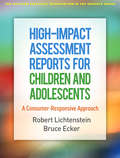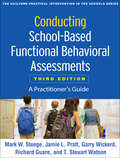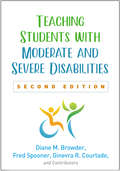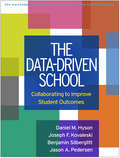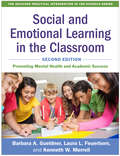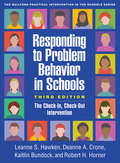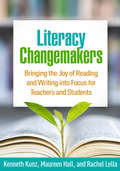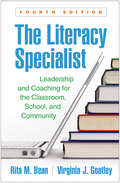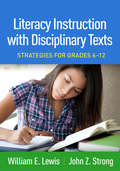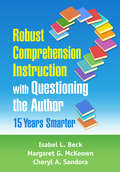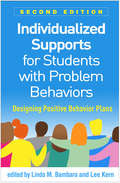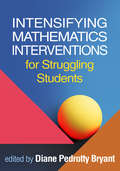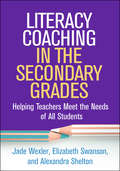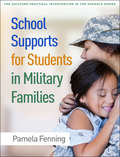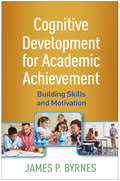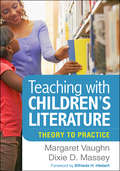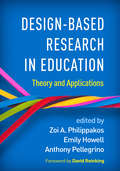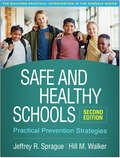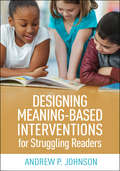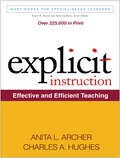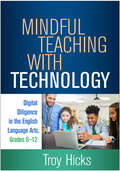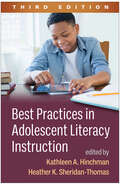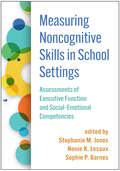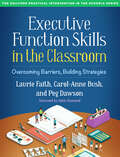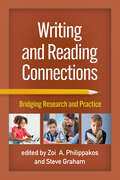- Table View
- List View
High-Impact Assessment Reports for Children and Adolescents: A Consumer-Responsive Approach (The Guilford Practical Intervention in the Schools Series)
by Robert Lichtenstein Bruce EckerAssessment provides rich opportunities for understanding the needs of children and adolescents, yet reports are often hard for parents, teachers, and other consumers to comprehend and utilize. This book provides step-by-step guidelines for creating psychoeducational and psychological reports that communicate findings clearly, promote collaboration, and maximize impact. Effective practices for written and oral reporting are presented, including what assessment data to emphasize, how to organize reports and convey test results, and how to craft useful recommendations. In a large-size format with lay-flat binding for easy photocopying, the book includes sample reports, training exercises, and reproducible templates, rubrics, and forms. Purchasers get access to a Web page where they can download and print the reproducible materials. This book is in The Guilford Practical Intervention in the Schools Series, edited by T. Chris Riley-Tillman.
Conducting School-Based Functional Behavioral Assessments, Third Edition: A Practitioner's Guide (The Guilford Practical Intervention in the Schools Series)
by Richard Guare T. Steuart Watson Frank M. Gresham Mark W. Steege Jamie L. Pratt Garry WickerdWidely recognized as a gold-standard resource, this authoritative book has been revised and expanded with 50% new material. It provides a complete introduction to functional behavioral assessment (FBA), complete with procedures, forms, and tools that have been piloted and refined in both general and special education settings. Numerous vivid examples illustrate how to use the authors' behavior-analytic problem-solving model (BAPS) to synthesize assessment results and guide the design of individually tailored interventions. Practitioners and students enjoy the engaging, conversational tone. In a large-size format with lay-flat binding for easy photocopying, the book includes 17 reproducible checklists and forms. Purchasers get access to a companion Web page where they can download and print the reproducible materials. New to This Edition *Revised BAPS model reflects the latest research and offers a more comprehensive approach to FBA. *Chapters on professional and ethical standards; analyzing how biological/medical conditions, thoughts, and emotions influence behavior; and analyzing how executive skills deficits influence behavior. *Chapters on testing hypotheses about the functions of problem behavior; testing reinforcer effectiveness; and evaluating function-based interventions. *Chapter providing applied learning experiences for professionals and students. *Most of the reproducible tools are new or revised. This book is in The Guilford Practical Intervention in the Schools Series, edited by T. Chris Riley-Tillman.
Teaching Students with Moderate and Severe Disabilities, Second Edition
by Diane M. Browder Fred Spooner Ginevra R. Courtade and ContributorsFor years the text of choice for developing excellence as a teacher of K–12 students with moderate and severe disabilities, this clearly written work has now been revised and updated. Chapters provide step-by-step procedures for designing standards-based individualized education plans and evaluating and enhancing student progress. Methods and materials for teaching literacy, mathematics, science, and social studies are described in depth. The book also describes effective ways to build functional daily living skills. User-friendly features include extensive vignettes and classroom examples, end-of-chapter application exercises, and reproducible planning and assessment tools. Purchasers get access to a Web page where they can download and print the reproducible materials in a convenient 8 1/2" x 11" size. New to This Edition *Reflects important advances in research and evidence-based practice. *Chapter on collaborating with culturally diverse families, plus a stronger multicultural focus throughout. *Chapter on writing instruction. *Two additional chapters on reading and math, ensuring coverage of both foundational and grade-aligned skills. *Increased attention to students with autism spectrum disorder and to uses of technology.
The Data-Driven School: Collaborating to Improve Student Outcomes (The Guilford Practical Intervention in the Schools Series)
by Daniel M. Hyson Joseph F. Kovaleski Benjamin Silberglitt PhD Jason A. PedersenThis indispensable practitioner's guide helps to build the capacity of school psychologists, administrators, and teachers to use data in collaborative decision making. It presents an applied, step-by-step approach for creating and running effective data teams within a problem-solving framework. The authors describe innovative ways to improve academic and behavioral outcomes at the individual, class, grade, school, and district levels. Applications of readily available technology tools are highlighted. In a large-size format with lay-flat binding for easy photocopying, the book includes learning activities and helpful reproducible forms. Purchasers can download and print the reproducible forms, as well as access Excel spreadsheets and PowerPoint slides related to the book, at the companion website. This book is in The Guilford Practical Intervention in the Schools Series, edited by Sandra M. Chafouleas.
Social and Emotional Learning in the Classroom: Promoting Mental Health and Academic Success (The Guilford Practical Intervention in the Schools Series)
by Kenneth W. Merrell Barbara A. Gueldner Laura L. FeuerbornThis trusted resource--now in a thoroughly updated second edition reflecting the tremendous growth of the field--provides a best-practice guide to planning and implementing social and emotional learning (SEL) in K–12 classrooms and schools. The authors present a roadmap to help practitioners choose exemplary programs and strategies, integrate SEL with academics and mental health interventions, create culturally affirming programming for diverse students, use assessment to guide data-based decision making, and support educator SEL. In a convenient large-size format, the volume includes illustrative vignettes and 24 reproducible worksheets and other practical tools. Purchasers get access to a Web page where they can download and print the reproducible materials. New to This Edition *Chapter on educators&’ social and emotional competence and teacher wellness. *Expanded coverage of implementation and systems issues, strategies for weaving SEL into the school day, applying SEL within a multi-tiered system of support, and professional development. *Numerous new and revised worksheets--now downloadable--including new educator reflection activities in each chapter. *Timely topics and themes infused throughout--such as culturally responsive and trauma-informed practices, teacher–family–community partnerships, and relationships as a foundation to SEL success--plus updated SEL resources. This book is in The Guilford Practical Intervention in the Schools Series, edited by Sandra M. Chafouleas.
Responding to Problem Behavior in Schools, Third Edition: The Check-In, Check-Out Intervention (The Guilford Practical Intervention in the Schools Series)
by Leanne S. Hawken Robert H. Horner Deanne A. Crone Kaitlin BundockNow revised and expanded with the latest research and adaptations for additional target behaviors, this is the gold-standard guide to Check-In, Check-Out (CICO), the most widely implemented Tier 2 behavior intervention. CICO is designed for the approximately 10–15% of students who fail to meet schoolwide behavioral expectations but who do not require intensive, individualized supports. In a large-size format for easy photocopying, the book includes step-by-step procedures and reproducible tools for planning and implementation. At the companion website, purchasers can download and print the reproducible tools and can access online-only training materials, sample daily progress reports, and an Excel database for managing daily data. (Second edition subtitle: The Behavior Education Program.) New to This Edition *Chapters on CICO in alternative educational settings and for students with internalizing behavior problems. *Content on using CICO for attendance issues, academic and organizational skills, and recess behavior problems. *Chapter on layering additional targeted interventions onto CICO. *Chapter with specific recommendations for training and coaching school teams. *Expanded chapters on frequently asked questions, implementation in high school, and culturally responsive practices. *Supplemental online-only training and data management tools. *Updated throughout with current data and evidence-based procedures. See also Dr. Hawken's training DVD, Check-In, Check-Out, Second Edition: A Tier 2 Intervention for Students at Risk. Also available: the authors' work on intensive interventions for severe problem behavior, Building Positive Behavior Support Systems in Schools, Second Edition: Functional Behavioral Assessment. This book is in The Guilford Practical Intervention in the Schools Series, edited by Sandra M. Chafouleas.
Literacy Changemakers: Bringing the Joy of Reading and Writing into Focus for Teachers and Students
by Kenneth Kunz Maureen Hall Rachel LellaThis inspiring book shows how K–12 teachers, literacy specialists and coaches, and school- and district-level administrators can work together to make needed instructional improvements while fostering a lifelong love of reading and writing. The book presents collaborative leadership strategies and research-based best practices for creating joyful, effective learning environments. It includes ways to evaluate and recalibrate literacy programs for sustainable change, provide students with a wide variety of engaging reading opportunities, meet the needs of English learners and adolescent learners, partner with families, and enhance professional learning and development. Teacher-friendly features include practical tips and "Stop, Think, and Take Action" sections in each chapter. Several reproducible forms can be downloaded and printed in a convenient 8 1/2" x 11" size.
The Literacy Specialist, Fourth Edition: Leadership and Coaching for the Classroom, School, and Community
by Rita M. Bean Virginia J. GoatleyThe definitive practitioner resource and text for developing excellence as a PreK–12 literacy/reading specialist is now updated to reflect key changes in the field. Delving into the literacy specialist's multiple leadership roles, the book provides strategies for teaching children experiencing difficulty with reading and writing; supporting teachers through coaching and professional learning opportunities; designing curricula; conducting assessments at the student, classroom, and school levels; and building strong school, family, and community partnerships. Pedagogical features include vignettes from exemplary practitioners, questions for discussion and reflection, follow-up activities, and ideas for instructors and workshop leaders. Reproducible forms and worksheets can be downloaded and printed in a convenient 8½" x 11" size. Previous edition title: The Reading Specialist, Third Edition. New to This Edition *Broader view of literacy now encompasses reading, writing, oral language, and digital and visual literacies. *Grounded in the International Literacy Association's updated Standards 2017. *New or expanded discussions of multi-tiered systems of support, culturally responsive practice, uses of technology in instruction and professional learning, successful practices in middle and high school settings, and coaching. *Extended case example that follows one literacy specialist through her entire first year in a school. *Appendix with website resources.
Literacy Instruction with Disciplinary Texts: Strategies for Grades 6-12
by William E. Lewis John Z. StrongTo develop strong disciplinary literacy skills, middle and high school students need to engage with diverse types of challenging texts in every content area. This book provides a blueprint for constructing literacy-rich instructional units in English language arts, science, and social studies. The authors describe how to design interconnected text sets and plan lessons that support learning and engagement before, during, and after reading. Presented are ways to build academic vocabulary and background knowledge, teach research-based comprehension strategies, and guide effective discussions and text-based writing activities. Chapters also cover how to teach students to write argumentative, informative, and narrative essays, and to conduct discipline-specific inquiry. Special features include sample text sets and 24 reproducible planning templates and other teaching tools; purchasers get access to a Web page where they can download and print the reproducible materials in a convenient 8 1/2" x 11" size.
Robust Comprehension Instruction with Questioning the Author: 15 Years Smarter
by Isabel L. Beck Margaret G. McKeown Cheryl A. SandoraThis practical K–12 teacher resource explains the "whats," "whys," and "how-tos" of using Questioning the Author (QtA), a powerful approach for enhancing reading comprehension and engagement. Thorough yet concise, the book shows how to plan lessons using both narrative and expository texts, formulate open-ended Queries, and guide class discussions around them. The authors discuss how QtA has evolved over many years of classroom application and include innovative ideas for integrating vocabulary instruction and writing prompts into QtA lessons. Also provided are steps for gradually transitioning from teacher-led instruction to independent reading. The book features extended examples of teachers implementing QtA, as well as four complete texts that can be downloaded and printed for classroom use.
Individualized Supports for Students with Problem Behaviors, Second Edition: Designing Positive Behavior Plans (The\guilford School Practitioner Ser.)
by Linda M. Bambara Lee KernNoted for providing everything needed to develop individualized positive behavior support (PBS) plans for students with pervasive behavioral challenges, this authoritative guide has been revised and expanded to reflect 15 years of changes in the field. The book walks practitioners through the PBS process, emphasizing a team-based approach and presenting assessment procedures, intervention strategies, and guiding questions. Detailed case examples illustrate ways to meet the diverse needs of students across abilities, grade levels (PreK–12), and problem behaviors. In a convenient large-size format, the book follows the sequence of a typical PBS course, making it ideal for use in teaching and training. New to This Edition *Incorporates current tools and practices within an expanded, whole-school PBS approach. *Chapters on multi-tiered systems of support and the fundamentals of classroom management. *Chapter on writing, monitoring, and evaluating a complete PBS plan. *Two extended case examples that run through many of the chapters. *&“Commentaries from the Field&” in which leading experts reflect on the contributions, challenges, and future directions of PBS.
Intensifying Mathematics Interventions for Struggling Students (The Guilford Series on Intensive Instruction)
by Diane Pedrotty BryantThis key resource for K–12 educators offers a systematic guide to delivering Tier 2 and 3 math interventions within a multi-tiered system of support. The volume explains critical math areas in which many students have difficulty--early numeracy, time and money measurement, number combinations, fractions, word-problem solving, algebra, and more. Leading experts describe relevant standards and show how to use data-based individualization to plan, monitor, and intensify instruction in each area. Beginning with bulleted guiding questions, chapters feature a wealth of evidence-based intervention strategies, lesson-planning ideas, and case examples. Reproducible instructional activities and planning forms can be downloaded and printed in a convenient 8 1/2" x 11" size.
Literacy Coaching in the Secondary Grades: Helping Teachers Meet the Needs of All Students (The Guilford Series on Intensive Instruction)
by Elizabeth Swanson Jade Wexler Alexandra SheltonToo many adolescent learners still struggle with reading. This much-needed guide shows how to support teachers in providing effective literacy instruction in the content areas, which can be intensified as needed within a multi-tiered framework. Adaptive Intervention Model (AIM) Coaching was created for grades 6–8, but is equally applicable in high school. The book gives instructional coaches an accessible blueprint for evaluating, developing, and reinforcing each teacher's capacity to implement evidence-based literacy practices. User-friendly features include case studies, end-of-chapter reflection questions and key terms, and reproducible tools. Purchasers get access to a companion website where they can download and print the reproducible materials--plus supplemental lesson plans and other resources--in a convenient 8 1/2" x 11" size.
School Supports for Students in Military Families (The Guilford Practical Intervention in the Schools Series)
by Pamela FenningHow does growing up in a military family affect the educational experiences of children and youth? What can K–12 school practitioners do to support these students' academic, behavioral, and social-emotional success? This book describes effective ways to help students and their families navigate such challenges as relocation, school transitions, and parental deployment. Pamela Fenning presents strengths-based assessment, intervention, and prevention strategies that reflect deep knowledge of military culture and fit perfectly within a schoolwide multi-tiered system of support (MTSS). In a convenient large-size format, the book includes a reproducible data collection form that can be downloaded and printed for repeated use. This book is in The Guilford Practical Intervention in the Schools Series, edited by Sandra M. Chafouleas.
Cognitive Development for Academic Achievement: Building Skills and Motivation
by James P. ByrnesThis integrative text spotlights what educators need to know about children's cognitive development across grade levels (PreK-12) and content areas. The book provides a concise introduction to developmental neuroscience and theories of learning. Chapters on general cognitive abilities probe such crucial questions as what children are capable of remembering at different ages, what explains differences in effort and persistence, and how intelligence and aptitudes relate to learning. Domain-specific chapters focus on the development of key academic skills in reading, writing, math, science, and history. Multiple influences on academic achievement and motivation are explored, including school, family, cultural, and socioeconomic factors. Each chapter concludes with clear implications for curriculum and instruction.
Teaching with Children's Literature: Theory to Practice
by Margaret Vaughn Dixie D. MasseyPerhaps no factor has a greater influence on children&’s literacy learning than exposure to engaging, authentic, culturally relevant texts. This concise practitioner resource and course text helps K–8 teachers make informed choices about using children's literature in their classrooms, from selecting high-quality texts to planning instruction and promoting independent reading. The authors present relevant theories (such as reader response and culturally responsive pedagogy) and show how to apply them in practice. Key topics include teaching narrative and expository texts, tapping into students' individual interests, and conducting text-based writing activities and discussions. Every chapter features case examples, reflection questions, and learning activities for teachers; appendices list exemplary children&’s literature.
Design-Based Research in Education: Theory and Applications
by Zoi A. Philippakos, Emily Howell and Anthony PellegrinoEffective research in educational settings requires collaboration between researchers and school-based practitioners to codesign instruction and assessment, analyze findings to inform subsequent iterations, and make thoughtful revisions. This innovative reference and course text examines the theory and practice of design-based research (DBR), an important methodology for conducting studies in authentic educational contexts. Leading experts provide specific examples of high-quality DBR addressing different research foci, grade levels, and subject areas (literacy/English language arts, math, and science). Applications are presented for curriculum development, intervention, assessment, and digital contexts, as well as teaching second-language learners. Also addressed is DBR&’s role in educator preparation, professional development, dissertation research, and technical education.
Safe and Healthy Schools, Second Edition: Practical Prevention Strategies (The Guilford Practical Intervention in the Schools Series)
by Jeffrey R. Sprague Hill M. WalkerNow in a fully revised and updated second edition, this authoritative resource provides a complete toolkit for designing and implementing an evidence-based school safety plan. Foremost experts guide practitioners to understand and prevent violence, bullying, and peer harassment in grades K–12. Best practices are reviewed for creating a positive school climate and establishing effective security and crisis response procedures. The authors describe ways to identify and support behaviorally at-risk students across multiple tiers of intervention, beginning with universal screening. In a convenient large-size format, the book includes reproducible planning tools. Purchasers get access to a Web page where they can download and print the reproducible materials. New to This Edition *Reflects over 15 years of research advances, new initiatives, and the growth of universal prevention models. *Grounded in current positive behavioral interventions and supports (PBIS) practices; also incorporates restorative discipline, social–emotional learning, and trauma-informed practices. *State-of-the-art behavioral screening and threat assessment methods are integrated throughout. *Discussions of timely topics, including cyberbullying, the role and limitations of policing in schools, and racial/ethnic disparities in discipline. This book is in The Guilford Practical Intervention in the Schools Series, edited by Sandra M. Chafouleas.
Designing Meaning-Based Interventions for Struggling Readers
by Andrew P. JohnsonThis highly practical book helps K–8 teachers implement effective reading interventions that support meaningful comprehension and engage students with interesting, age-appropriate texts. Andrew P. Johnson presents a range of strategies for addressing difficulties in the core areas of word identification, fluency, and comprehension. Packed with illustrative figures, the book provides guidance and tools for assessing reading problems, combining and adapting interventions for particular students, planning writing activities to enhance reading, aligning efforts within a response-to-intervention framework, and designing individualized education programs. Informed by current research, Johnson candidly targets "educational malpractice&” and helps readers puzzle through the controversies surrounding dyslexia diagnoses and special education decision making.
Explicit Instruction: Effective and Efficient Teaching (What Works for Special-Needs Learners)
by Anita L. Archer Charles A. HughesExplicit instruction is systematic, direct, engaging, and success oriented--and has been shown to promote achievement for all students. This highly practical and accessible resource gives special and general education teachers the tools to implement explicit instruction in any grade level or content area. The authors are leading experts who provide clear guidelines for identifying key concepts, skills, and routines to teach; designing and delivering effective lessons; and giving students opportunities to practice and master new material. Sample lesson plans, lively examples, and reproducible checklists and teacher worksheets enhance the utility of the volume. Purchasers can also download and print the reproducible materials for repeated use. Video clips demonstrating the approach in real classrooms are available at the authors' website: www.explicitinstruction.org. See also related DVDs from Anita Archer: Golden Principles of Explicit Instruction; Active Participation: Getting Them All Engaged, Elementary Level; and Active Participation: Getting Them All Engaged, Secondary Level
Mindful Teaching with Technology: Digital Diligence in the English Language Arts, Grades 6-12
by Troy HicksTechnology is integral to teaching in the English language arts, whether in-person, hybrid, or remote. In this indispensable guide, Troy Hicks shows how to teach and model "digital diligence"--an alert, intentional stance that helps both teachers and students use technology productively, ethically, and responsibly. Resources and lesson ideas are presented to build adolescents' skills for protecting online privacy, minimizing digital distraction, breaking through &“filter bubbles,&” fostering civil conversations, evaluating information on the Internet, creating meaningful digital writing, and deeply engaging with multimedia texts. Dozens of websites, apps, and other tools are reviewed, with links provided at the companion website; end-of-chapter teaching points and guiding questions facilitate learning and application.
Best Practices in Adolescent Literacy Instruction, Third Edition
by Kathleen A. Hinchman Donna E. Alvermann Heather K. Sheridan-ThomasWith 50% new material reflecting current research and pedagogical perspectives, this indispensable course text and teacher resource is now in a thoroughly revised third edition. Leading educators provide a comprehensive picture of reading, writing, and oral language instruction in grades 5–12. Chapters present effective practices for motivating adolescent learners, fostering comprehension of multiple types of texts, developing disciplinary literacies, engaging and celebrating students' sociocultural assets, and supporting English learners and struggling readers. Case examples, lesson-planning ideas, and end-of-chapter discussion questions and activities enhance the utility of the volume. New to This Edition *Chapters on new topics: building multicultural classrooms, Black girls&’ digital literacies, issues of equity and access, and creating inclusive writing communities. *New chapters on core topics: academic language, learning from multiple texts, and reading interventions. *Increased attention to issues of diversity, equity, and inclusion. *The latest knowledge about adolescents' in- and out-of-school literacies.
Measuring Noncognitive Skills in School Settings: Assessments of Executive Function and Social-Emotional Competencies
by Stephanie M. Jones, Nonie K. Lesaux and Sophie P. BarnesChildren's social–emotional and self-regulation skills are critical for success in school and, ultimately, in the workplace. How can educators determine the most effective approaches for measuring students' interpersonal competencies? And how can they use the data to improve their own practice? Relevant for school leaders, educators, researchers, and other stakeholders, this book brings together leading experts from multiple disciplines to discuss the current state of measurement and assessment of a broad range of noncognitive skills and present an array of innovative tools. Chapters describe measures targeting the individual student, classroom, whole school, and community; highlight implications for instructional decision making; examine key issues in methodology, practice, and policy; and share examples of systematic school- and districtwide implementation.
Executive Function Skills in the Classroom: Overcoming Barriers, Building Strategies (The Guilford Practical Intervention in the Schools Series)
by Peg Dawson Laurie Faith Carol-Anne BushWith insight and humor, this motivating guide shows how to bring executive functions (EF) to the forefront in K–8 classrooms--without adopting a new curriculum or scripted program. Ideal for professional development, the book includes flexible, practical, research-based ideas for implementation in a variety of classroom contexts. It shares stories from dozens of expert teachers who are integrating explicit EF support across the school day. Provided is a clear approach for talking about EF barriers and strategies as part of instruction, and working as a class to problem-solve, explore, and apply the strategies that feel right for each student. Purchasers get access to a Web page where they can download and print several reproducible tools in a convenient 8 1/2" x 11" size. This book is in The Guilford Practical Intervention in the Schools Series, edited by Sandra M. Chafouleas.
Writing and Reading Connections: Bridging Research and Practice
by Steve Graham Zoi A. PhilippakosWriting skills are essential for success in the 21st-century school and workplace, but most classrooms devote far more time to reading instruction, with writing often addressed in isolation or excluded. In this insightful professional development resource and text, leading researchers discuss why and how to integrate writing and reading instruction in grades K–12 and beyond. Contributors explore how to harness writing–reading connections to support learning in such areas as phonics and spelling, vocabulary, understanding genre and text structure, and self-regulated strategy development, as well as across content areas and disciplines. Special considerations in teaching emergent bilingual students and struggling literacy learners are described. User-friendly features include guiding questions, classroom examples, and action questions that help teachers translate the research and concepts into practice.
